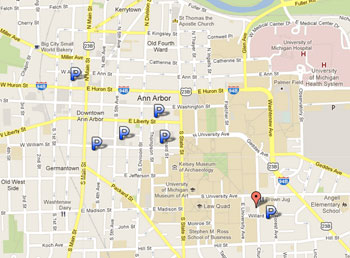Parking As Residential Incentive: Where?
About 40 monthly parking permits in Ann Arbor’s public parking system – to be sold to a proposed project at 624 Church St. – have been the topic of discussion by the Ann Arbor Downtown Development Authority in the last few months.

The location of the 624 Church St. project is indicated with a red pushpin. Locations of structures in Ann Arbor’s public parking system are indicated with blue Ps.
Most recently, at the Dec. 19 meeting of the DDA’s operations committee, the discussion focused on location: For which of the six public parking structures would monthly permits be sold? The developer of the 624 Church St. project would prefer that the project be allowed to buy permits in the Forest parking structure.
The Forest facility, a joint venture of the DDA and the University of Michigan, is the structure closest to the proposed residential development. According to the developer’s Nov. 28 submittal to the city, the 13-story project would include more than 80,000 square feet of new floor area with the following configuration of apartments: 11 one-bedroom; 21 two-bedroom; 33 three-bedroom; and 11 four-bedroom units. That’s a total of 76 apartments, with 196 bedrooms.
The developer, Opus Development Corp., has already won approval from the DDA’s board to satisfy the project’s parking requirement without providing onsite spaces – by instead using the contribution in lieu (CIL) program. The CIL provides an option to purchase monthly permits, but the cost is at a rate 20% higher than standard pricing.
Discussion by the DDA operations committee on Dec. 19 centered around the issue of fairness: Would allowing the purchase of permits in the Forest structure give the developer of the 624 Church St. project an unfair competitive advantage in the South University area rental market? Raising the fairness issue was DDA board member Roger Hewitt, who owns Revive + Replenish, which is a tenant in the ground floor of the Zaragon Place on East University. Zaragon is a nine-story apartment building with almost 250 bedrooms, catering to the student rental market.
Other board members did not perceive the issue to be problematic, from the perspective of fairness to already-existing projects. And Susan Pollay, executive director of the DDA, pointed out that the decision to allow a project to purchase monthly parking permits is a tool that’s available to the DDA to help make a private development possible that otherwise would not be. In the case of 624 Church St., building parking spaces on that site isn’t feasible. Hewitt was concerned that the strategy – if the DDA allowed permits to be purchased at a structure very near to projects – might result in an incentive for developers in the future not to build any onsite parking.
The committee’s discussion was inconclusive, but committee members indicated they wanted to develop a formal policy on which parking structures would be chosen for monthly permits sold under the CIL program. The 624 Church St. project is due to come before the city planning commission on Jan. 15, so the developer would prefer to have the issue settled by then. But given the DDA’s desire first to establish a policy that would guide this and future decisions, it’s unlikely it will be finalized as early as mid-January.
Based on the committee’s discussion, capacity in the parking system does not appear currently to be a limiting factor on selling CIL permits. The committee also reviewed the latest monthly parking data, which shows continued increased usage of the new underground garage, Library Lane.
Revenues per space in the Library Lane structure are now beginning to approach those of on-street parking spaces, but are still the lowest of any facility in the system. That’s due in part to a discounted rate offered to induce holders of permits in other structures to move to Library Lane.
Also of interest at the operations committee meeting was a draft policy for holding events on top of the Library Lane structure, including the closure of the mid-block cut-through, Library Lane itself. [Full Story]



